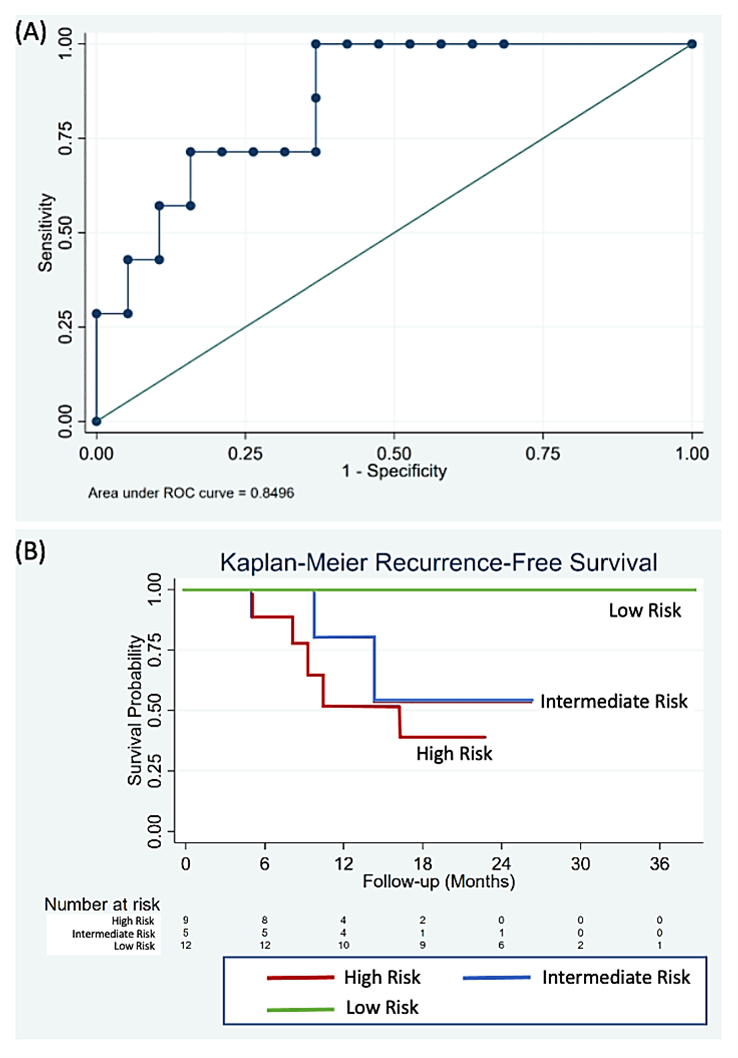Back
Poster, Podium & Video Sessions
Moderated Poster
MP54: Bladder Cancer: Non-invasive II
MP54-09: Urine Comprehensive Genomic Profiling Predicts Recurrence in Patients with Non-muscle Invasive Bladder Cancer Treated with Intravesical Therapy
Monday, May 16, 2022
8:45 AM – 10:00 AM
Location: Room 228
Goran Rac*, Shalin Desai, Hiten D. Patel, Chirag Doshi, Ryan Dornbier, Maywood, IL, Vincent Caruso, Peter Lentz, Brian C. Mazzarella, Kevin G. Phillips, Trevor Levin, South San Francisco, CA, Alan J. Wolfe, Gopal N. Gupta, Maywood, IL

Goran Rac, MD
Loyola University Medical Center
Poster Presenter(s)
Introduction: Intravesical therapy (IVT) is the standard of care for high grade NMIBC. Despite treatment, patients often recur. There is currently no reliable test to assist with risk stratification of patients after treatment. We evaluate an algorithm using urinary comprehensive genomic profiling (uCGP) for recurrence prediction in a prospective cohort with long term follow-up.
Methods: 26 NMIBC patients deemed to be IVT candidates without prior history of IVT were prospectively enrolled from 1/2019 - 3/2020. 88% of subjects received BCG while 12% received Gemcitabine induction. Urine was collected prior to IVT instillation and analyzed using CLIA-validated uCGP (UroAmplitude, Convergent Genomics) to comprehensively measure 60 genes. Blinded classification (high, intermediate, & low recurrence risk) was performed. Hazard ratio, sensitivity, specificity, and AUC for the ROC curve were calculated. Kaplan-Meier curves and log-rank tests were analyzed.
Results: High recurrence risk was predicted in 34.6% patients, intermediate in 19.2%, and low recurrence risk in 42.3%. At a mean follow up of 22 mo, 5 (19.2%) patients had a biopsy-confirmed recurrence with an additional 2 (7.7%%) having positive urine cytology without biopsy confirmation. Assessing both types of recurrence, high and intermediate risk prediction had a sensitivity of 100% and specificity of 63.2%. No low recurrence risk subjects experienced recurrence (NPV 100%). An AUC of 0.85 was achieved. High recurrence risk prediction was associated with a 6.5x elevated risk of future recurrence when compared to the other two risk categories, HR=6.5, 95%CI(1.2, 33.8), p=0.026. Kaplan-Meier curves confirmed distinct recurrence free survival between the prediction categories (log-rank p=0.013). Among recurrent patients, the high and intermediate risk groups predicted recurrence a median of 293 days ahead of clinical standard of care diagnosis.
Conclusions: uCGP shows notable promise for prediction of NMBIC recurrence in patients undergoing IVT. Though further study is warranted, this tool may enable risk prognosis among patients with a clinically high risk of recurrence and disease progression.
Source of Funding: Support for this research is provided by the NCI through a SBIR Grant, 5R44CA200174, provided to Convergent Genomics.

Methods: 26 NMIBC patients deemed to be IVT candidates without prior history of IVT were prospectively enrolled from 1/2019 - 3/2020. 88% of subjects received BCG while 12% received Gemcitabine induction. Urine was collected prior to IVT instillation and analyzed using CLIA-validated uCGP (UroAmplitude, Convergent Genomics) to comprehensively measure 60 genes. Blinded classification (high, intermediate, & low recurrence risk) was performed. Hazard ratio, sensitivity, specificity, and AUC for the ROC curve were calculated. Kaplan-Meier curves and log-rank tests were analyzed.
Results: High recurrence risk was predicted in 34.6% patients, intermediate in 19.2%, and low recurrence risk in 42.3%. At a mean follow up of 22 mo, 5 (19.2%) patients had a biopsy-confirmed recurrence with an additional 2 (7.7%%) having positive urine cytology without biopsy confirmation. Assessing both types of recurrence, high and intermediate risk prediction had a sensitivity of 100% and specificity of 63.2%. No low recurrence risk subjects experienced recurrence (NPV 100%). An AUC of 0.85 was achieved. High recurrence risk prediction was associated with a 6.5x elevated risk of future recurrence when compared to the other two risk categories, HR=6.5, 95%CI(1.2, 33.8), p=0.026. Kaplan-Meier curves confirmed distinct recurrence free survival between the prediction categories (log-rank p=0.013). Among recurrent patients, the high and intermediate risk groups predicted recurrence a median of 293 days ahead of clinical standard of care diagnosis.
Conclusions: uCGP shows notable promise for prediction of NMBIC recurrence in patients undergoing IVT. Though further study is warranted, this tool may enable risk prognosis among patients with a clinically high risk of recurrence and disease progression.
Source of Funding: Support for this research is provided by the NCI through a SBIR Grant, 5R44CA200174, provided to Convergent Genomics.


.jpg)
.jpg)